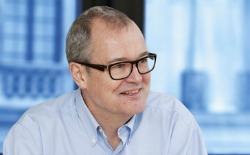 GlaxoSmithKline ($GSK) is preparing to move the granulocyte macrophage colony-stimulating factor (GMCSF) antibody it licensed from MorphoSys (ETR:MOR) into a Phase II trial in osteoarthritis of the hand. The move opens up a new possible indication for the drug, which GSK saw primarily as a treatment for rheumatoid arthritis when it picked it up in a €445 million ($483 million) deal.
GlaxoSmithKline ($GSK) is preparing to move the granulocyte macrophage colony-stimulating factor (GMCSF) antibody it licensed from MorphoSys (ETR:MOR) into a Phase II trial in osteoarthritis of the hand. The move opens up a new possible indication for the drug, which GSK saw primarily as a treatment for rheumatoid arthritis when it picked it up in a €445 million ($483 million) deal.
 |
| Patrick Vallance--Courtesy of GSK |
GSK3196165 had already come through a Phase I/II trial in mild to moderate rheumatoid arthritis when GSK decided to license the GMCSF antibody from MorphoSys. Since then, GSK has continued to advance the drug as a treatment for rheumatoid arthritis while also looking at other possible indications for the therapy. Having identified the macrophage as a mediator of the destruction of tissue in osteoarthritis and the potential of its drug in animal models, GSK is now revving up for a Phase II trial in the indication that is due to start next year.
With GSK3196165 reducing pain in animal models of osteoarthritis, GSK could go after any of the manifestations of the disease. But the difficulties of trialling drugs against some common forms of the disease has led the company to decide it will be easiest to show the effect of GSK3196165 in osteoarthritis of the hand. "If you try and do a trial in osteoarthritis in the knee or the hip it is confounded by weight, it is confounded by how much you walk, how much activity you choose to do and many, many other things," GSK R&D Chief Patrick Vallance said.
Vallance was speaking at the GSK R&D day in New York this week, at which he and his fellow execs sought to reassure skittish investors that the company's pipeline will deliver in the years to come. The event failed on this level--shares in GSK closed down 1.4% in New York--but it provided reasons for optimism at GSK's partners. With GSK taking an ax to its internal operations, it is looking to spend on a project basis. "That releases a very significant amount of fixed cost," GSK CEO Andrew Witty said. "It has allowed us to spend more on projects."
- read the release
- and the presentation (PDF)